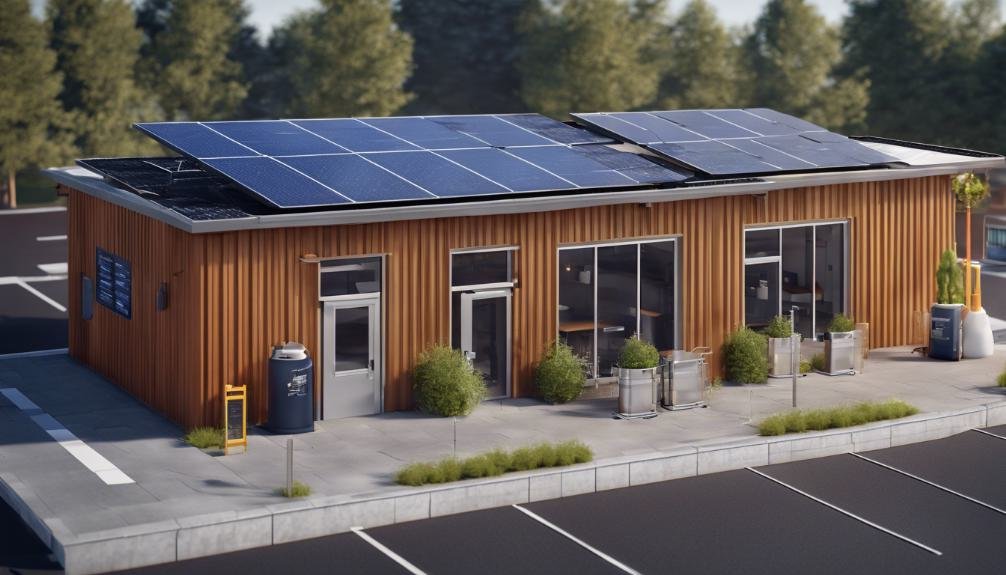Sustainability Practices for Small Businesses
To enhance sustainability in your small business, focus on energy efficiency by conducting audits and investing in renewable energy sources. Reduce waste through proper management and reusable packaging. Source responsibly from local suppliers, prioritize fair trade, and implement eco-friendly packaging. Encourage green transportation methods and water conservation practices. Engage employees in sustainability initiatives and build community partnerships. Track your carbon footprint, consider renewable energy integration, and explore financial incentives. By implementing these practices, you'll not only benefit the environment but also improve your business's reputation and save costs.
Key Takeaways
- Conduct energy audits to identify and reduce consumption.
- Implement waste management plans for environmental impact.
- Source responsibly for ethical standards and brand reputation.
- Promote green transportation methods for a healthier planet.
- Engage employees in sustainability initiatives for a greener workplace.
Energy Efficiency
To enhance energy efficiency in your small business, consider conducting an energy audit to identify areas where you can reduce energy consumption. Energy audits help pinpoint where energy is being used inefficiently and suggest ways to make improvements.
Implementing energy-saving tips such as turning off lights when not in use, using natural light whenever possible, and adjusting thermostats can lead to significant savings. Additionally, investing in energy-efficient appliances like refrigerators, HVAC systems, and lighting can reduce electricity usage and operational costs in the long run.
Exploring renewable energy options such as solar panels or wind turbines can further optimize your energy efficiency. These sustainable alternatives not only reduce your carbon footprint but also provide long-term energy savings. When considering renewable options, make sure to evaluate the feasibility and potential return on investment for your specific business needs.
Waste Reduction
Consider implementing a thorough waste management plan to streamline operations and reduce environmental impact within your small business. Start by setting up a composting program for organic waste and incorporating reusable packaging to minimize single-use materials.
Upcycling initiatives can also be beneficial, where you repurpose items that would otherwise be discarded into new products or materials.
To tackle food waste reduction, monitor and track your inventory closely to avoid over-purchasing and spoilage. Implement practices like portion control to manage food waste effectively. Additionally, consider donating excess food to local charities or farms for animal feed.
Regularly review your waste management processes to identify areas for improvement and guarantee compliance with local regulations. Encourage employee involvement by providing training on waste reduction practices and promoting a culture of sustainability within your business.
Sustainable Sourcing
When sourcing materials for your small business, consider forming ethical partnerships with suppliers to promote fair labor practices and environmentally friendly production methods.
Local sourcing can reduce your carbon footprint and support the community while fostering transparency in your supply chain.
Ethical Supplier Partnerships
Explore the benefits of forging ethical supplier partnerships through sustainable sourcing practices to enhance your small business's commitment to social and environmental responsibility. When engaging in fair trade and responsible sourcing, you not only contribute to the well-being of communities and the environment but also build a positive brand reputation.
Here are some key considerations to keep in mind:
- Transparency: Establish clear communication channels with your suppliers to guarantee they adhere to ethical standards and practices.
- Quality Assurance: By prioritizing responsible sourcing, you can assure the quality and authenticity of the products or materials you use in your business operations.
- Community Impact: Supporting fair trade initiatives and responsibly sourced products can have a significant positive impact on the communities involved in the supply chain.
- Long-Term Partnerships: Cultivating ethical supplier partnerships fosters trust and loyalty, leading to sustainable business relationships that benefit all parties involved.
Local Materials Sourcing
Prioritize sourcing materials locally to reduce the carbon footprint and support the economy of your community, aligning with sustainable practices for your small business. By working with local artisans and procuring indigenous materials, you not only contribute to the preservation of traditional craftsmanship but also reduce the environmental impact of transportation associated with sourcing materials from distant locations. Embracing eco-friendly sourcing practices through local materials procurement can enhance the authenticity and uniqueness of your products while fostering a stronger connection with your community.
| Local Artisans | Sustainable Practices | Eco-Friendly Sourcing |
|---|---|---|
| Collaborate with local artisans to create unique products that showcase traditional craftsmanship. | Implement sustainable practices such as reducing waste and recycling materials in your production processes. | Source materials locally to minimize the carbon emissions from transportation and support the use of eco-friendly materials. |
Green Transportation
Implementing green transportation practices can greatly reduce the environmental impact of your small business operations while also cutting costs in the long run. By incorporating sustainable transportation methods, you can decrease carbon emissions and contribute to a healthier planet.
Here are some practical ways to introduce green transportation into your business:
- Public Transit: Encouraging your employees to use public transportation for their daily commute can significantly reduce the number of individual vehicles on the road, lowering emissions and traffic congestion.
- Bicycle Commuting: Installing bike racks at your workplace and promoting bicycle commuting can't only reduce carbon footprint but also improve the health and well-being of your employees.
- Carpooling: Implementing a carpooling program among your employees can help minimize the number of vehicles on the road, leading to reduced emissions and cost savings for everyone involved.
- Electric Vehicles: Consider updating your company vehicles to electric options to eliminate emissions and reduce your overall carbon footprint significantly.
Water Conservation
When considering water conservation for your small business, incorporating efficient plumbing fixtures and implementing a rainwater harvesting system can greatly reduce water usage and costs.
Efficient plumbing fixtures like low-flow toilets and faucets can help cut down on water waste, while a rainwater harvesting system can collect and store rainwater for non-potable uses.
Efficient Plumbing Fixtures
Consider installing low-flow faucets and water-efficient toilets to reduce water consumption in your small business's restrooms. Upgrading to eco-friendly plumbing fixtures not only helps the environment but can also lead to substantial cost savings in the long run.
Here are some key benefits of utilizing efficient plumbing fixtures:
- Water Efficient Toilets: Switching to toilets with dual flush mechanisms or low-flow options can decrease water usage per flush, saving gallons of water daily.
- Low-Flow Faucets: Installing faucets with aerators can greatly decrease water flow rates without compromising functionality, conserving water with each use.
- Sensor-Activated Fixtures: Consider sensor-operated faucets and toilets that only run when in use, preventing unnecessary water wastage.
- Water-Efficient Sinks: Opt for sinks with automatic shut-off features or low-flow designs to limit water usage during handwashing, promoting sustainability.
Rainwater Harvesting System
Implementing a rainwater harvesting system can greatly improve your small business's water conservation efforts. By collecting rainwater from your rooftop, you can reduce your reliance on municipal water sources and lower your water bills.
To enhance the quality of harvested rainwater, consider installing a water filtration system. This can help remove impurities and debris, making the water suitable for various uses within your business.
Utilizing rainwater for irrigation systems is a practical way to support sustainability. By connecting the harvested rainwater to your irrigation system, you can efficiently water your landscaping and potentially even establish rooftop gardens. This not only conserves water but also adds aesthetic value to your business premises.
Moreover, implementing a rainwater harvesting system contributes to stormwater management. By capturing rainwater that would otherwise contribute to runoff, you can reduce the strain on municipal drainage systems and help prevent flooding in your area.
Eco-Friendly Packaging
To enhance your small business's sustainability efforts, prioritize utilizing eco-friendly packaging solutions that reduce environmental impact and appeal to environmentally-conscious consumers.
When it comes to eco-friendly packaging, there are various options available that can help you align your business with sustainable practices effectively:
- Biodegradable Alternatives: Explore packaging materials made from biodegradable substances like cornstarch or sugarcane bagasse, which break down naturally, reducing landfill waste.
- Custom Designs: Consider creating custom packaging designs that not only showcase your brand but also use sustainable materials and minimalistic designs to reduce environmental footprint.
- Compostable Options: Look for packaging solutions that are certified compostable, allowing them to decompose into nutrient-rich soil when disposed of properly.
- Innovative Solutions: Stay abreast of the latest innovations in eco-friendly packaging, such as mushroom-based packaging or seaweed-based alternatives, to stay ahead in sustainability practices and attract eco-conscious customers.
Employee Engagement
Engage your employees proactively in sustainability initiatives to foster a culture of environmental responsibility within your small business. Encouraging team building activities that focus on sustainability can be a great way to involve your employees.
Consider organizing sustainability workshops where employees can learn about eco-friendly practices and brainstorm ideas for making your business more environmentally friendly.
Establishing a green team within your organization can also be beneficial. This team can spearhead sustainability efforts, coordinate employee training on eco-friendly practices, and monitor the progress of your sustainability initiatives.
Providing employees with the necessary training and resources is important to make sure that they understand the importance of sustainability and feel empowered to contribute to your business's green efforts.
Community Partnerships
Engaging in local charity collaborations can foster goodwill within your community while supporting causes aligned with your business values.
Hosting eco-friendly events not only showcases your commitment to sustainability but also provides a platform to educate and inspire others.
Supporting community initiatives demonstrates your dedication to making a positive impact beyond your business operations.
Local Charity Collaborations
When forming sustainability practices for your small business, consider establishing collaborations with local charities to create meaningful community partnerships. Working with charities not only benefits the community but also enhances your company's reputation and employee morale.
Here are some ways local charity collaborations can be beneficial:
- Fundraising Events: Partnering with local charities for fundraising events can help raise awareness about important causes while also giving your business exposure within the community.
- Volunteer Opportunities: Offering volunteer opportunities for your employees to support local charities fosters a sense of social responsibility and teamwork within your company.
- Collaborative Campaigns: Joining forces with charities on collaborative campaigns can amplify the impact of your sustainability efforts and attract a wider audience.
- Community Engagement: By actively engaging with local charities, you demonstrate your commitment to social responsibility and build lasting relationships with community members.
Eco-Friendly Events Hosting
Consider integrating eco-friendly practices into your small business by partnering with local communities to host sustainable events. To guarantee your event is environmentally conscious, opt for green catering options such as locally sourced, organic food and biodegradable serving ware. Implement outdoor composting stations to reduce food waste and create nutrient-rich soil for community gardens. Choose zero waste decorations made from recycled materials or items that can be reused for future events. Additionally, prioritize carbon neutral transportation by encouraging attendees to carpool, use public transport, or provide shuttle services.
Collaborating with community partners allows you to tap into shared resources, spread the message of sustainability, and engage with a broader audience. By working together, you can amplify the impact of your eco-friendly events and inspire others to adopt sustainable practices. Remember to communicate your commitment to sustainability throughout the event and provide educational materials on the importance of reducing waste and carbon emissions.
Through these efforts, you can create memorable events that not only benefit your business but also contribute positively to the environment and local community.
Supporting Community Initiatives
Partnering with local community organizations can greatly enhance your small business's impact on sustainability and social responsibility. By engaging with community initiatives, you not only contribute to the betterment of your local area but also foster a positive reputation for your business.
Consider the following strategies to support community partnerships:
- Community Gardens: Collaborate with local gardening groups to create green spaces that benefit the environment and provide fresh produce for the community.
- Volunteer Programs: Establish volunteer programs for your employees to engage with local organizations, such as schools or shelters, to give back to those in need.
- Local Fundraisers: Host or sponsor fundraisers for causes that align with your business values, encouraging community involvement and support.
- Charity Drives: Organize donation drives for essential items like clothing or food, partnering with charities to distribute them to those in need.
Carbon Footprint Tracking
To effectively track and reduce your small business's carbon footprint, begin by implementing a thorough monitoring system that captures all relevant emissions data. Utilize greenhouse gas tracking tools to measure your carbon emissions accurately.
Once you have a clear understanding of your carbon footprint, consider implementing emission reduction strategies such as optimizing energy use, reducing waste production, and promoting sustainable transportation options for your employees.
Additionally, explore carbon offsetting programs that allow you to invest in projects that reduce carbon emissions to balance out your own environmental impact. Obtaining sustainability certifications can also help showcase your commitment to reducing your carbon footprint and operating in an environmentally responsible manner.
Renewable Energy Integration
To optimize your small business's sustainability efforts further, integrating renewable energy sources into your operations can greatly reduce your carbon footprint and enhance your environmental impact. Consider incorporating solar panels and wind turbines into your energy mix. Here are some key points to keep in mind:
- Solar Panels: Installing solar panels on your business premises can harness the power of the sun to generate electricity. This renewable energy source is clean, sustainable, and can markedly lower your reliance on traditional grid power.
- Wind Turbines: Utilizing wind turbines can also be a viable option, especially if your business is located in an area with consistent wind patterns. Wind energy is another clean and renewable source that can help you decrease your carbon emissions.
- Financial Incentives: Research available financial incentives such as tax credits, rebates, or grants that can help offset the initial investment in renewable energy systems.
- Energy Storage: Consider incorporating energy storage solutions like batteries to store excess energy generated by solar panels or wind turbines for use during periods of low production or high demand.
Frequently Asked Questions
How Can Small Businesses Encourage Sustainable Commuting for Employees?
To promote eco-friendly commuting, consider offering incentives like flexible work hours or telecommuting options. Encourage biking, carpooling, or using public transit through benefits such as subsidies, parking discounts, or reward programs. Make green commuting attractive and convenient.
What Are Some Creative Ways to Engage Employees in Sustainability Efforts?
To engage employees in sustainability efforts, start by aligning goals with personal values. Encourage participation through team building activities that promote a sense of community and purpose. Implement friendly competitions, recognition programs, and ongoing education to foster enthusiasm.
How Can Small Businesses Calculate Their Carbon Footprint Accurately?
To calculate your carbon footprint accurately, start by tracking energy use across operations. Measure electricity, fuel consumption, and waste production. Utilize online calculators for guidance. Consider carbon offsetting to balance emissions and prioritize energy efficiency for sustainability.
Are There Any Tax Incentives for Small Businesses Implementing Renewable Energy?
Like a beacon in the dark, tax incentives shine for small businesses embracing renewable energy. By implementing eco-friendly practices, you can not only reduce your carbon footprint but also save money through these incentives.
How Can Small Businesses Effectively Measure the Impact of Community Partnerships on Sustainability?
To effectively measure the impact of community partnerships on sustainability, start by engaging stakeholders in discussions. Conduct detailed impact assessments that consider sustainable supply chains and local sourcing. Track outcomes to evaluate progress and make informed decisions.
Conclusion
In summary, implementing sustainability practices for small businesses is essential for creating a greener, more responsible future. By focusing on energy efficiency, waste reduction, sustainable sourcing, and other eco-friendly initiatives, you can reduce your carbon footprint while also saving money in the long run.
Remember, every small step towards sustainability counts, so start making changes today to make a positive impact on the planet and your bottom line!








